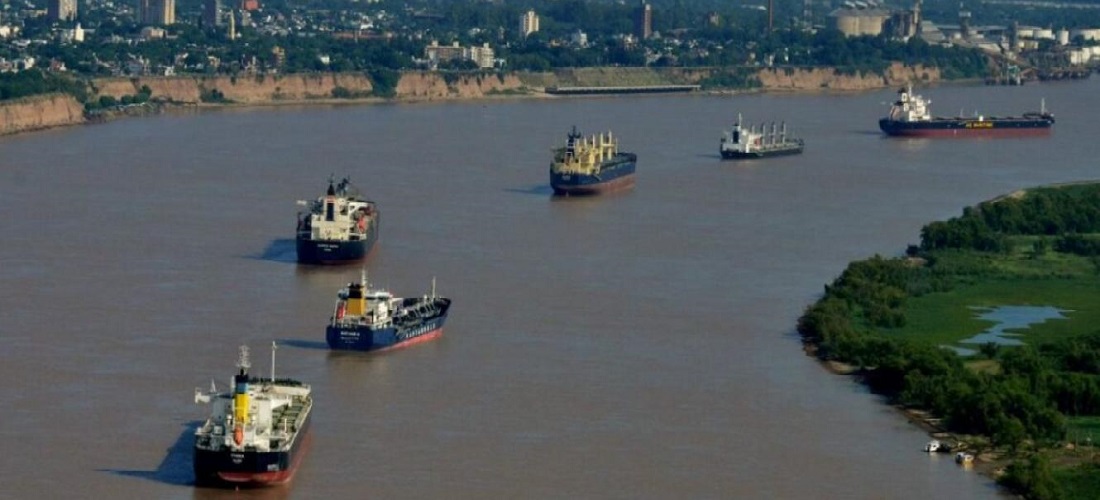
Argentina seeks dispute settlement over Yacyretá, waterway conflict
Sep, 25, 2023 Posted by Gabriel MalheirosWeek 202339
Argentina’s Ministry of Economy, led by Sergio Massa, is hopeful that the energy conflict with Paraguay will be resolved soon. Last week, the neighboring country announced that it would stop supplying energy produced at the Yacyretá hydroelectric power plant due to a debt of less than $100 million. “There is another underlying issue,” pointed out official sources, and it is related to international trade through the waterway. Argentina’s strategy is to resolve both negotiations separately, to which they have already submitted proposals.
Last Monday (September 18), Paraguay’s Vice President, Pedro Alliana, announced that Paraguay had ceased supplying energy produced at Yacyretá to Argentina due to a $93 million debt. Each of the countries has access to 50% of the power generated there. Still, as Paraguay does not utilize its entire share, it engages in what is known as “energy assignment,” which is precisely what they cut off.
The news caught the government economically off guard, but not politically. Economically, they explained that Argentina owes Paraguay $93 million for unpaid balances between 2022 and 2023. However, they stated that the only overdue portion is from 2022, which amounts to $36 million.
“The conflict began with the waterway toll issue, and then they involved Yacyretá, mixing everything up,” government sources said. Exactly a year ago, Argentina started charging a fee for the circulation of goods in the Parauguay-Parana River waterway. The Paraguayan government argues that this fee needs to be suspended. President Santiago Peña stated that during Massa’s visit to Asunción at the end of August, he promised to suspend the charge, which Massa’s close associates deny.
Regarding Yacyretá, the Argentine government ensured that, throughout the history of debts between the two countries, there have been delays of up to $390 million in the balance, and shipments were not interrupted. “The reaction is inexplicable,” said a high-ranking source. From 1994 to the present, Argentina has transferred $6,622 million for the 186,863 GWh provided, according to official sources, at an average cost of $35.62 per MWh.
When asked how Argentina would compensate for the missing energy supply, government sources explained, “Currently, this is not a problem because we are covering it with gas. However, it could become a problem in the summer when demand increases.” Therefore, the Ministry of Economy will seek to resolve the conflict.
The proposal was to pay the $36 million debt in three installments of $12 million by the end of the year and the 2023 debt starting next year. If an agreement is reached, the first installment will be disbursed this week, with the condition that the energy be restored immediately. “It’s an interesting proposal,” said Paraguay’s Vice President Alliana publicly. Additionally, the government will request another condition: an energy price review.
There is irritation in the Argentine government due to Alliana’s constant public statements. “The conversations are strictly in a private negotiating environment, and he keeps making statements. He is lacking in terms of diplomatic codes,” said sources at the Ministry of Economy.
The Economic Ministry’s strategy was to separate the issues: Yacyretá on one side and the waterway topic on the other. Possible retaliation, such as suspending gas exports to Paraguay, with YPF being a key supplier to the neighboring country, has been rejected by the Economic Ministry for now. However, Argentina has added two topics to the negotiation table: Paraguay indicating how it imputes the energy price and opening a medium-term debate after the presidential elections to sort out a debt of Paraguay with Argentina, which the government claims is over $28,000 million.
The government’s position is that the treaty signed between Argentina and Paraguay establishes that the energy cost must factor interest and debt amortization which amounted to $28,445 million. “This point is never considered,” explained official sources.
This was recorded in a letter that Fernando de Vido, executive director of the binational entity Yacyretá, sent last Thursday to director Luis Benítez Cuevas. “It is vital to initiate a historical economic-financial sorting process,” the letter states, redefining energy cost concepts. “Regarding construction and maintenance, it is necessary to address the payment of the debt that the binational entity owes to the Argentine Republic, in the amount of $28,445 million, as the sole contributor to the plant’s construction,” the letter states.
Waterway issues
Regarding the conflict over the fee, official sources told Ámbito that they will maintain the charge, arguing that it is used for dredging and navigation signaling and adding that Argentina does not wish to “subsidize the foreign trade of other countries.” However, to reach an agreement, they have proposed a 25% reduction in the fee until December 31 “to sustain minimum investments and unlock the conflict,” followed by continuous technical negotiations. Since February of this year, this fee has been $1.47, generating revenue of $12 million.
-
Ports and Terminals
Mar, 18, 2019
0
Brazil container throughput is expected to grow at an average annual rate of 6.5% until 2023, driving ECSA growth
-
Ports and Terminals
Feb, 20, 2020
0
Cargo handling at Itajaí Port registers 20% growth in January
-
Grains
Sep, 14, 2021
0
Agribusiness exports reach a record US$ 10.9 billion in August
-
Other Cargo
Nov, 14, 2023
0
Brazilian Egg Exports Surprisingly Surge by 75% Year-on-Year



